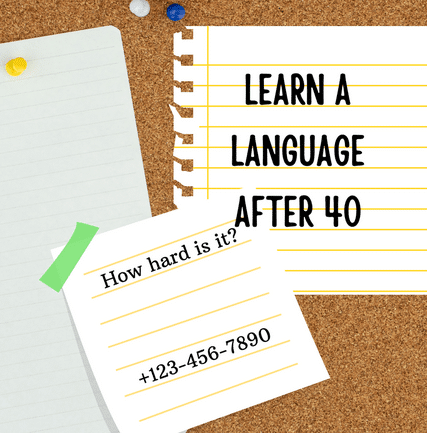Needless to say, acquiring a second language is a great way to build a global network and explore a new culture and much more, but the question is how hard is it to learn a new language after the age of 40.
Learning a second language can seem like a daunting task at any age, let alone after the age of 40. But based on my humble teaching and linguistic experience, if done the right way, learning a foreign language after 40 not only is doable but it’s also very rewarding at many levels.
Actually, I myself, a 50-year-old polyglot, have just begun a journey of learning an additional language: Spanish.
In my experience as a teacher of Arabic, I have had the chance of working with people from all walks of life and different age groups. Actually, students in their 30s, 40s and 50s showed more rigor and success in learning the language than their younger peers, possibly because they are more disciplined, focused and motivated.
If you are wondering whether you can learn a foreign language after the age of 40, rest assured that you definitely can. Actually, the personal, professional and cognitive rewards of learning a foreign language far exceed the investment of time, money and effort for acquiring it.
Table of Contents
Five benefits of learning foreign language after 40
Learning a new language can enrich your life by broadening your perspective and deepening your knowledge of different cultures. Learning a new language also makes you more attractive and helps you connect with more people because you will understand different ways of expressing yourself and be able to contribute meaningfully to conversations.
Actually there haven’t been better times to pick up a foreign language, as it has become much more convenient and affordable with online language platforms such as iTalki and Mondly to start learning any language you can think of.
The following is not an exhaustive list but contains some of the benefits one can reap from learning a new language after 40:
1. Confidence booster
Acquiring a new language comes with its perks of course, one of which is deservedly becoming more confident both at the personal and professional levels. You can showcase your linguistic skills in social settings and all the cultural and linguistic knowledge that comes with it. In addition, and needless to say, speaking a foreign language is also quite attractive to the opposite sex.
Professionally, and no matter what your profession is, the ability to speak or understand a different language makes you a better job candidate and more valuable member in any team. It could also open more international travel and business opportunities for you over your monolingual colleagues and competitors.
2. Improved Communication
Intercultural communication is essential for any professional or personal relationship and is key for mutual understanding. By learning a new language, you will have an easier time navigating many cross-cultural settings, be it your foreign neighbors, your host country or international business partners. Improved communication translates into improved relationships with others and allows for healthier and more positive ties with people around you. This will make it easier for you to get along with people at work and home.
3. Better Work-Life Balance
Learning a language is also a fun and interesting hobby and a great activity to engage in outside of your daily work routine. Tracking your progress and practicing what you have learned at every opportunity you can get is very rewarding in itself.
This will also encourage you to seek out and participate in international social and cultural events in your city and elsewhere.
4. Learning Keeps the Brain Young
Brain function is closely linked to memory, learning, and attention. As we age, the areas of the brain responsible for motor, sensory, and cognitive skills start to accumulate less oxygen and weaken. As a result, we become less alert, have reduced ability to learn new tricks, and are more likely to develop aphasia (loss of language). Learning a new language keeps the brain young by providing stimulation and creating and regenerating new neural pathways.
Just like lifting weight helps aging individuals slow down or even reverse naturally-occuring muscle loss, language learning slows down and reverse memory loss and other weakening natural processes inside the brain.
5. Bilingualism Improves Cognition
Bilingual people have a higher average IQ than monolingual people. Multiple studies found that people who speak two languages have a higher average IQ than monolingual people. A bilingual person may have a higher IQ than a monolingual person due to the higher neuro-linguistic processing and abilities that occur in the brains of bilingual people regardless of age. You can explore more of this on The Bilingual Brain or Life as a Bilingual . Of course this applies more to individuals who have acquired a second language during childhood, but you get the gist.
Tips on learning a new language after 40
Learning a new language does require effort, but it shouldn’t be stressful or strenuous if it’s done right . Here are five tips on how to learn a new language after 40 without disrupting your daily routine getting frustrated:
- Focus on the Basics – The first step toward learning a new language is to learn the basics. Getting your base language right will make later steps easier. This will make you more fluent and ensure you are on the right track. That is to say don’t rush to learn the cool and easy aspect of a language firs. Just slow down and start with the foundation.
- Set small incremental goals – The best way to learn a new language is to divide your overall objective into smaller bit-sized steps. That is to set up realistic and achievable goals. Each achieved small goal will boost your confidence and motivate you to set and reach new goals. For example, if you want to learn Arabic, start with the small goal of learning to recognize and pronounce the Abjads (Arabic Alphabets). This is a fundamental and easy step in learning Arabic that will motivate you to start learning words based on themes. You can achieve this goal just by signing up for a low-cost course on Mondly. You can achieve mastery of this goal in no more than two weeks.
- Practice Makes Perfect – Learning a new language is like learning a new one daily. You should spend at least half an hour speaking or listening to the new language on a daily basis. This daily exposure, even for only 10 minutes, will quickly add up within the first weeks and months to speed up your language learning journey. It’s important to realize that consistency beats intensity when it comes to learning and mastering a language or any new skill for that matter. For instance, grabbing a good textbook of Arabic or French and working on it daily for only 10 to 20 minutes will work miracles by the time you reach three, six or nine months of consistent practice.
- Read Books – Reading is another excellent way to expand your vocabulary and learn about different cultures. Once you learn and master the basics of Arabic, for example, you can move on to read beginner Arabic short stories that were written with learners of Arabic in mind.
- Use an App – Many smartphones today have a prominent dictionary feature. You can select words and phrases you don’t know and have definitions and examples. This can be an excellent way to familiarize yourself with new terms. This can also be used as a listening tool. Apps offered by language learning platforms like Mondly and Duolingo are also great tools for learning the foreign language at your own convenience whenever and wherever you want.
Conclusion
Learning a new language is a great way to expand your horizons and learn about a new culture in times of globalization and open borders. It’s also remember that you just have to start.
If you want to test the waters first, take advantage of a free trial at iTalki or Mondly and continue on their low-fee monthly subscription and enjoy the journey. No one knows where this language adventure can take you, and you won’t know if you don’t start.






